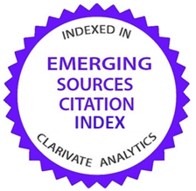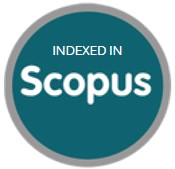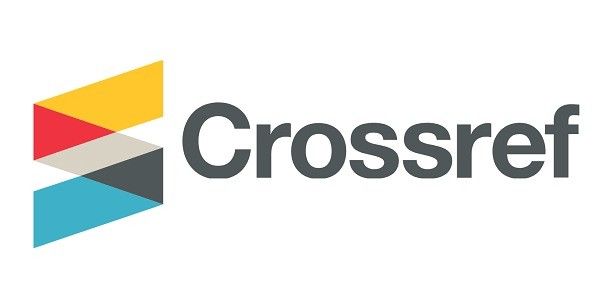Influencia de estilos de liderazgo en comportamiento innovador de alumnos de educación militar superior tecnológica
DOI:
https://doi.org/10.21830/19006586.817Palabras clave:
innovación, formación militar, liderazgo, liderazgo transaccional, liderazgo transformacionalResumen
Esta investigación replica el estudio de la influencia de los estilos de liderazgo en el comportamiento innovador de cadetes peruanos de Norena-Chavez et al. (2021), en una muestra de 200 alumnos del Instituto de Educación Superior Tecnológico Público del Ejército-ETE (Lima, Perú). Se emplea la técnica de ecuaciones estructurales utilizando mínimos cuadrados parciales (PLS-SEM). Se confirmó que existe influencia de los estilos de liderazgo transformacional y transaccional sobre el comportamiento innovador de los alumnos. De acuerdo con la varianza explicada, el liderazgo transformacional explica el 47 % y el liderazgo transaccional, el 59 % de la variabilidad del comportamiento innovador. Esta investigación contribuye a mejorar la comprensión de la relación de los estilos de liderazgo y del comportamiento innovador en el ámbito militar.
Descargas
Referencias bibliográficas
Afsar, B., & Umrani, W. A. (2019). Transformational leadership and innovative work behaviour: The role of motivation to learn, task complexity and innovation climate. European Journal of Innovation Management, 23(3), 402-428. https://doi.org/10.1108/ejim-12-2018-0257
Akram, T., Lei, S., & Haider, M. J. (2016). The impact of relational leadership on employee innovative work behaviour in IT industry of China. Arab Economic and Business Journal, 11(2), 153-161. https://doi.org/10.1016/j.aebj.2016.06.001
Al-Husseini, S., El Beltagi, I., & Moizer, J. (2019). Transformational leadership and innovation: the mediating role of knowledge sharing amongst higher education faculty. International Journal of Leadership in Education, 1-24. https://doi.org/10.1080/13603124.2019.1588381
Anderson, J. C., & Gerbing, D. W. (1988). Structural equation modeling in practice: A review and recommended two-step approach. Psychological Bulletin, 103(3), 411-423. http://dx.doi.org/10.1037/0033-2909.103.3.411
Anderson, N., Potočnik, K., & Zhou, J. (2014). Innovation and creativity in organizations: A state-of-the-science review and prospective commentary. Journal of Management, 40(5), 1297-1333. https://doi.org/10.1177/0149206314527128
Aryee, S., Walumbwa, F. O., Zhou, Q., & Hartnell, C. A. (2012). Transformational leadership, innovative behavior, and task performance: Test of mediation and moderation processes. Human Performance, 25(1), 1-25. https://doi.org/10.1080/08959285.2011.631648
Avolio, B. J., & Bass, B. M. (1995). Individual consideration viewed at multiple levels of analysis: A multi-level framework for examining the diffusion of transformational leadership. The Leadership Quarterly, 6(2), 199-218. https://doi.org/10.1016/1048-9843(95)90035-7
Bani-Melhem, S., Zeffane, R., & Albaity, M. (2018). Determinants of employees’ innovative behaviour. International Journal of Contemporary Hospitality Management, 30(3), 1601-1620. https://doi.org/10.1108/IJCHM-02-2017-0079
Bass, B. M. (1990). From transactional to transformational leadership: Learning to share the vision. Organizational Dynamics, 18(3), 19-31.
Bass, B. M., & Avolio, B. J. (2000). MLQ Multifactor Leadership Questionnaire. Sampler set: technical report, leader form, rater form, and scoring key for MLQ Form 5XShort (2nd ed.). Mindgarden.
Bednall, T. C., Rafferty, A., Shipton, H., Sanders, K., & Jackson, C. (2018). Innovative behaviour: How much transformational leadership do you need? British Journal of Management, 29(4), 796-816.
Bilal, A., Ahmad, W., Jan, M. F., Huseynov, R., & Nagy, H. (2021). How women’s transformational leadership induces employees’ innovative behaviour through trust and connectivity: A sequential mediation model. Global Business Review. https://doi.org/10.1177/0972150920982760
Burns, J. M. (1978). Leadership. Harper & Row.
Chin, W. (1998). The partial least square approach to structural equation modelling. En G. Marcoulides (Ed.), Modern methods for business research (pp. 295-369). Lawrence Erlbaum.
Choi, S. B., Kim, K., Ullah, S. E., & Kang, S. W. (2016). How transformational leadership facilitates innovative behavior of Korean workers. Personnel Review, 45(3), 459-479. https://doi.org/10.1108/PR-03-2014-0058
Cohen, J. (1998). Statically power analysis for the behavioral sciences. Laurence Erlbaum Associates.
Cooper, C. D., Kong, D. T., & Crossley, C. D. (2018). Leader humor as an interpersonal resource: Integrating three theoretical perspectives. Academy of Management Journal, 61(2), 769-796. https://doi.org/10.5465/amj.2014.0358
Dartey-Baah, K., Quartey, S. H., & Adotey, A. (2020). Examining transformational and transactional leadership styles and safety citizenship behaviors in the power distribution sector: evidence from Ghana. International Journal of Energy Sector Management, 15(1), 173-194. https://doi.org/10.1108/IJESM-07-2020-0008
Demerouti, E., Bakker, A. B., & Gevers, J. M. (2015). Job crafting and extra-role behavior: The role of work engagement and flourishing. Journal of Vocational Behavior, 91, 87-96. https://doi.org/10.1016/j.jvb.2015.09.001
Efron, B. (1979). Computers and the theory of statistics: Thinking the unthinkable. SIAM Review, 21(4), 460-480.
Eldor, L., & Harpaz, I. (2016). A process model of employee engagement: The learning climate and its relationship with extra‐role performance behaviors. Journal of Organizational Behavior, 37(2), 213-235. https://doi.org/10.1002/job.2037
Fang, Y., Chen, J., Wang, M., & Chen, C. (2019). The impact of inclusive leadership on employees’ innovative behaviors: the mediation of psychological capital. Frontiers in psychology, 10, 1803. https://doi.org/10.3389/fpsyg.2019.01803
Faraz, N. A., Yanxia, C., Ahmed, F., Estifo, Z. G., & Raza, A. (2018). The influence of transactional leadership on innovative work behavior—a mediation model. European Journal of Business and Social Sciences, 7(1), 51-62.
Fornell, C., & Larcker, D. F. (1981). Evaluating structural equation models with unobservable variables and measurement error. Journal of Marketing Research, 18(1), 39-50.
Hair, J. F., Ringle, C. M., & Sarstedt, M. (2011). PLS-SEM: Indeed a silver bullet. Journal of Marketing theory and Practice, 19(2), 139-152. https://doi.org/10.2753/MTP1069-6679190202
Hair, J. F., Hult, G. T., Ringle, C., & Sarstedt, M. (2014). A primer on partial least squares structural equation modeling (PLS-SEM). Sage.
Han, S. H., Oh, E. G., Kang, S. (2020). The link between transformational leadership and work-related performance: moderated-mediating roles of meaningfulness and job characteristics. Leadership & Organization Development Journal, 41(4), 519-533. https://doi.org/10.1108/LODJ-04-2019-0181
Hansen, J. A., & Pihl-Thingvad, S. (2019). Managing employee innovative behaviour through transformational and transactional leadership styles. Public Management Review, 21(6), 918-944. https://doi.org/10.1080/14719037.2018.1544272
Henseler, J., Ringle, C. M. & Sarstedt, M. (2015). A new criterion for assessing discriminant validity in variance-based structural equation modeling. Journal of the Academic of Marketing Science, 43(1), 115- 135. https://doi.org/10.1007/s11747-014-0403-8
Hoch, J. E., Bommer, W. H., Dulebohn, J. H., & Wu, D. (2018). Do ethical, authentic, and servant leadership explain variance above and beyond transformational leadership? A meta-analysis. Journal of Management, 44(2), 501-529. https://doi.org/10.1177%2F0149206316665461
Howell, J. M., & Avolio, B. J. (1993). Transformational leadership, transactional leadership, locus of control, and support for innovation: Key predictors of consolidated-business-unit performance. Journal of Applied Psychology, 78(6), 891-902. https://doi.org/10.1037/0021-9010.78.6.891
Janssen, O. (2004). How fairness perceptions make innovative behavior more or less stressful. Journal of Organizational Behavior, 25(2), 201-215. https://doi.org/10.1002/job.238
Javed, B., Abdullah, I., Zaffar, M. A., Haque, A., & Rubab, U. (2019). Inclusive leadership and innovative work behavior: The role of psychological empowerment. Journal of Management & Organization, 25(4), 554-571. https://doi.org/10.1017/jmo.2018.50
Karatepe, O. M., & Olugbade, O. A. (2016). The mediating role of work engagement in the relationship between high-performance work practices and job outcomes of employees in Nigeria. International Journal of Contemporary Hospitality Management, 28(10), 2350-2371.
Kark, R., Van Dijk, D., & Vashdi, D. R. (2018). Motivated or demotivated to be creative: The role of self‐regulatory focus in transformational and transactional leadership processes. Applied Psychology, 67(1), 186-224. https://doi.org/10.1111/apps.12122
Kim, J., & McLean, G. N. (2015). An integrative framework for global leadership competency: Levels and dimensions. Human Resource Development International, 18(3), 235-258. https://doi.org/10.1080/13678868.2014.1003721
Leroy, H., Anseel, F., Gardner, W. L., & Sels, L. (2015). Authentic leadership, authentic followership, basic need satisfaction, and work role performance: A cross-level study. Journal of Management, 41(6), 1677-1697. https://doi.org/10.1177/0149206312457822
Li, H., Sajjad, N., Wang, Q., Muhammad, A., Khaqan, Z., & Amina, S. (2019). Influence of transformational leadership on employees’ innovative work behavior in sustainable organizations: Test of mediation and moderation processes. Sustainability, 11(6), 1594. https://doi.org/10.3390/su11061594
Mokhber, M., Khairuzzaman, W., & Vakilbashi, A. (2018). Leadership and innovation: The moderator role of organization support for innovative behaviours. Journal of Management & Organization, 24(1), 108-128. https://doi.org/10.1017/jmo.2017.26
Mustika, H., Eliyana, A., Agustina, T. S., & Ratnasari, R. T. (2020). Knowledge sharing behavior between self-leadership and innovative behavior. Journal of Security & Sustainability Issues, 9, 148-157. http://doi.org/10.9770/jssi.2020.9.M(12)
Norena-Chavez, D., Céliz Kuong, J. O., & Guevara, R. (2021). Influencia de los estilos de liderazgo en el comportamiento innovador de cadetes peruanos. Revista Científica General José María Córdova, 19(33), 29-50. https://doi.org/10.21830/19006586.732
Noruzy, A., Dalfard, V. M., Azhdari, B., Nazari-Shirkouhi, S., & Rezazadeh, A. (2013). Relations between transformational leadership, organizational learning, knowledge management, organizational innovation, and organizational performance: An empirical investigation of manufacturing firms. The International Journal of Advanced Manufacturing Technology, 64(5-8), 1073-1085. https://doi.org/10.1007/s00170-012-4038-y
Pieterse, A. N., Van Knippenberg, D., Schippers, M., & Stam, D. (2010). Transformational and transactional leadership and innovative behavior: The moderating role of psychological empowerment. Journal of Organizational Behavior, 31(4), 609-623. https://doi.org/10.1002/job.650
Rafferty, A. E., & Griffin, M. A. (2004). Dimensions of transformational leadership: Conceptual and empirical extensions. The Leadership Quarterly, 15(3), 329-354. https://doi.org/10.1016/j.leaqua.2004.02.009
Raj, R., & Srivastava, K. B. (2016). Transformational leadership and innovativeness: The mediating role of organizational learning. Journal of Management Research, 16(4), 201-219. http://www.i-scholar.in/index.php/jmr/article/view/135439/0
Ringle, C.M., & Sarstedt, M. (2016). Gain more insight from your PLS-SEM results: The importance-performance map analysis. Industrial Management & Data Systems, 116(9), 1865-1886. http://dx.doi.org/10.1108/IMDS-10-2015-0449
Rodríguez-Sánchez, A., Devloo, T., Rico, R., Salanova, M., & Anseel, F. (2017). What makes creative teams tick? Cohesion, engagement, and performance across creativity tasks: A three-wave study. Group & Organization Management, 42(4), 521-547. https://doi.org/10.1177/1059601116636476
Scott, S. G., & Bruce, R. A. (1994). Determinants of innovative behavior: A path model of individual innovation in the workplace. Academy of Management Journal, 37, 580-607. https://doi.org/10.5465/256701
Shalley, C. E. (1995). Effects of coaction, expected evaluation, and goal setting on creativity and productivity. Academy of Management Journal, 38(2), 483-503. https://doi.org/10.5465/256689
Shin, S. J., Yuan, F., & Zhou, J. (2017). When perceived innovation job requirement increases employee innovative behavior: A sensemaking perspective. Journal of Organizational Behavior, 38(1), 68-86. https://doi.org/10.1002/job.2111
Siangchokyoo, N., Klinger, R. L., & Campion, E. D. (2020). Follower transformation as the linchpin of transformational leadership theory: A systematic review and future research agenda. The Leadership Quarterly, 31(1). https://doi.org/10.1016/j.leaqua.2019.101341
Sürücü, L., Maşlakcı, A., & Şeşen, H. (2021). The influence of transformational leadership on employees’ innovative behaviour in the hospitality industry: The mediating role of leader member exchange. tourism. An International Interdisciplinary Journal, 69(1), 19-31. https://doi.org/10.37741/t.69.1.2
Taştan, S. B., & Davoudi, S. M. M. (2015). An examination of the relationship between leader-member exchange and innovative work behavior with the moderating role of trust in leader: A study in the Turkish context. Procedia-Social and Behavioral Sciences, 181, 23-32. https://doi.org/10.1016/j.sbspro.2015.04.862
Tenuto, P. L., & Gardiner, M. E. (2018). Interactive dimensions for leadership: An integrative literature review and model to promote ethical leadership praxis in a global society. International Journal of Leadership in Education, 21(5), 593-607. https://doi.org/10.1080/13603124.2017.1321783
Wellman, N., Newton, D. W., Wang, D., Wei, W., Waldman, D. A., & LePine, J. A. (2019). Meeting the need or falling in line? The effect of laissez‐faire formal leaders on informal leadership. Personnel Psychology, 72(3), 337-359. https://doi.org/10.1111/peps.12308
Widodo, W., & Mawarto, M. (2020). Investigating the role of innovative behavior in mediating the effect of transformational leadership and talent management on performance. Management Science Letters, 10, 2175-2182. http://dx.doi.org/10.5267/j.msl.2020.3.019
Descargas
Publicado
Cómo citar
Número
Sección
| Estadísticas de artículo | |
|---|---|
| Vistas de resúmenes | |
| Vistas de PDF | |
| Descargas de PDF | |
| Vistas de HTML | |
| Otras vistas | |

























